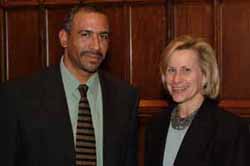Keeping the American Dream Alive for Urban Public School Children
The promise of the American Dream for many children lay with the public schools, according to Pedro A. Noguera, Sussman Visiting Professor of Education. These schools are the last safety net where children are provided adult supervision, access to a nurse, food, shelter and heat-even if they may not get those things at home. Because of this, public schools are vital to the health and welfare of all the children in the nation.
The Sussman Lecture and Professorship is made possible by the generosity of Teachers College Trustee Laurie Tisch Sussman. Noguera's lecture was entitled, "City Schools and the American Dream: Reclaiming the Promise of Public Education." He said that the United States has not effectively demonstrated that it has the will to provide all children with the education they need to pursue the American Dream.
The search for better education has become a blame game-on the students, the teachers, the schools and the parents. Focusing on blame only prevents them from focusing on responsibility. "This blame game doesn't get us very far, but it does contribute to the paralysis that says we can't do something about this," said Noguera, who is a professor in the Steinhardt School of Education at New York University.
The problem is not that poor children cannot be helped, he said. Noguera visited schools around the country and in the Caribbean that serve poor children have found a way to deliver high quality education. These schools put the "right ingredients together to mitigate the effects of poverty."
Concentrated poverty affects learning, school function and expectations that teachers have of students and pervades the entire educational process, he stated. Poverty becomes the reason why it's okay for that school to fail.
In order for these kids to succeed, they need more than just a good curriculum and teachers, continued Noguera. They need access to dental work and removal of lead paint from their homes. They also need access to eyeglasses because "you can't read if you can't see."
Healthcare is just one of the many problems that poverty-stricken children face. These children also need social workers and counselors. All of this is too much for teachers and schools to handle. They need help and support to achieve this.
"We need to design schools where the way kids and parents are served matters, or there won't be incentive for large scale change," said Noguera.
Two large issues in urban public schools are race and achievement, and safety and discipline. The United States has a long history of being confused about race. "It divides, polarizes, and paralyzes us as a country," he said.
Since this is such a part of the American history, it informs what is expected of schools. If schools do not think kids can do better, then they don't worry when they fail.
Some people blame the failure of urban schools on the different cultures of the students. However, in other countries where racial issues are not a part of the history, such as Trinidad, they produce academic excellence without changing the students' culture. This is also apparent in Historically Black Colleges, which produce more African-American graduates that go to medical school than all the Ivy League schools combined, he said.
Another large challenge for the public school system is discipline and safety. "Schools are out of control," said Noguera. "Teachers are afraid of kids and the schools are maintained like prisons."
Communities plagued with crime and lawlessness will have schools with those problems. Truly safe schools are not those with technological security. They are schools with healthy relationships between adults and kids. "Authority is rooted in that relationship, not in the position," he said.
Students need to realize that education is the way to the American Dream. To do this, public schools-especially in urban areas-have to think of the needs of the students. Focusing on their needs, rather than pushing testing, will help students want to learn and be in schools. This will build the necessary relationships between students, teachers and parents that will encourage them to achieve and feel safe. "Good education," he said, "will come from our ability as a nation to create the will and commitment to generate the schools we need."
Published Monday, Dec. 1, 2003
